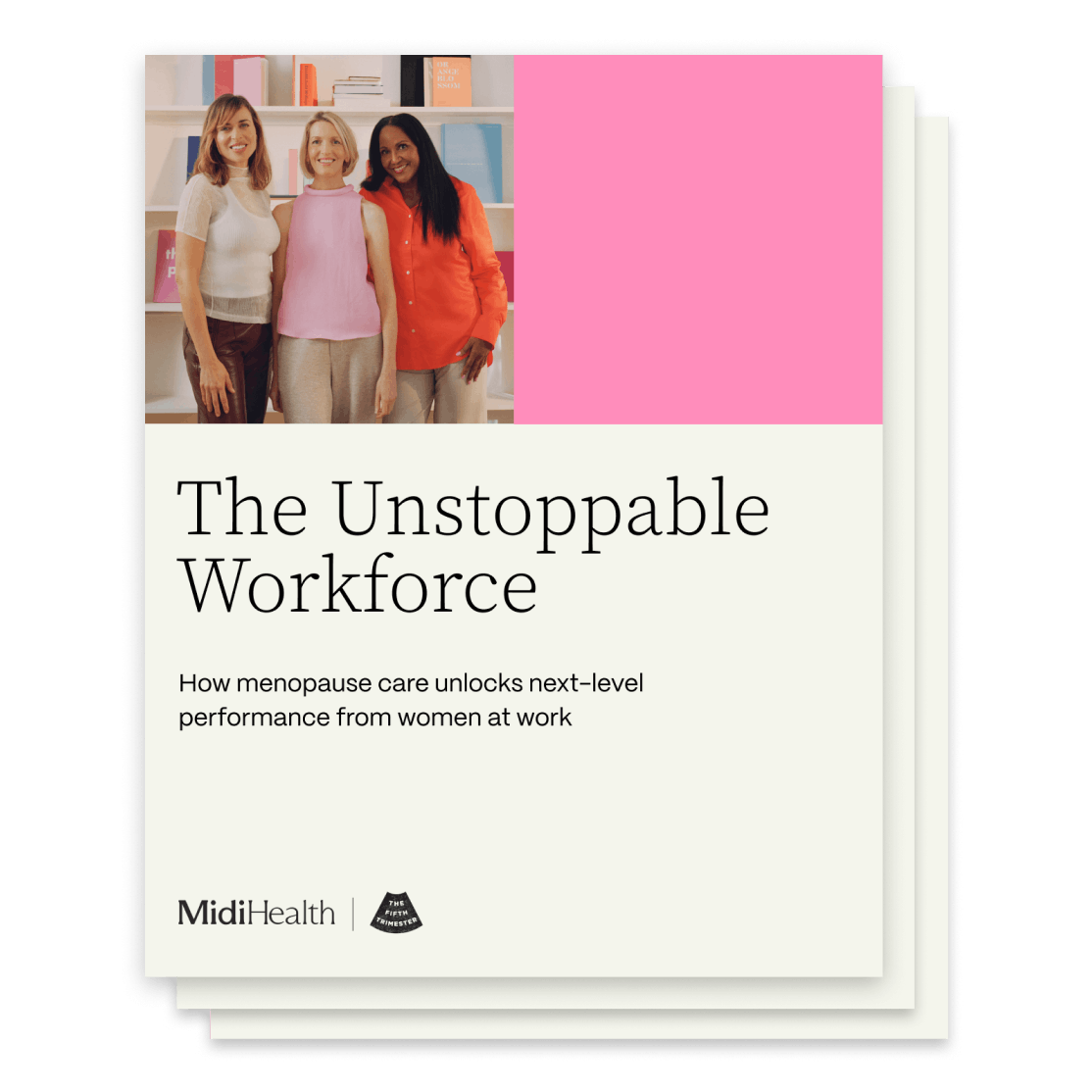For too long, working women have powered through menopause symptoms like fatigue, brain fog, and hot flashes without much support. But times are changing. The Menopause Society’s Making Menopause Work initiative is helping businesses create workplaces where women can thrive during this phase of life. From affordable care to flexible schedules, here are five smart (and doable) ways to support employees and make menopause work—for everyone.
Working women have been dealing with menopause symptoms while on the job since, well, forever. The difference today: More and more attention is being paid to the impact that tough-it-out approach has on both women and the businesses they support. And we’re learning that the cost of untreated menopause symptoms in female workers has gone underestimated and unaddressed for far too long.
The Menopause Society recognized the opportunity of this moment and launched Making Menopause Work, an initiative created to educate employers on why workers going through this phase of life need better support and how to go about providing it. The guidance is based on a scientific consensus report from a panel of experts, ranging from clinicians and researchers to labor attorneys and patient advocates.
We at Midi are 100% here for it.
Our leadership team spends a lot of time talking to employers and benefits consultants about the ways menopause affects women’s physical health, mental well-being, productivity, relationships, and so much more. We also meet many decision-makers who are already well aware of the impacts but lost on how to start creating a more menopause-supportive workplace.
The initiative’s Employer Guide and other resources are full of actionable suggestions on just that. And while there’s so much that we’re cheering over, these five takeaways are particular standouts:
1. Ensure Benefits Provide Access to Menopause Specialists
Menopause symptoms can be treated with medications, supplements, botanicals, and lifestyle changes. Unfortunately, many women aren’t given solutions because their providers either don’t know about them or attribute symptoms to something else entirely.
Primary care doctors often rely on OB/GYNs to address menopause symptoms. The thing is, almost half of U.S. counties have no OB/GYNs. And the vast majority of these specialists aren’t trained in menopause care or comfortable delivering it.
As a result, 75% of women who seek menopause care don’t get it.
Midi was founded for these very reasons. Women deserve access to midlife specialists who deeply understand their experience and can help them benefit from the most up-to-date research on menopause.
Every day, Midi patients tell our 250+ trained clinicians just how life-changing this level of care can be.
2. Make Sure Menopause Care is Affordable
Women in midlife spend more than any other age group on healthcare and 21% more than men.
Some of these expenses, such as recommended screenings, are unavoidable. Others are a product of a healthcare system that isn’t prepared to provide women with the care they need. When it comes to menopause, women often see six or more doctors about their symptoms. That’s a lot of added and potentially unmanageable healthcare costs for employees. If they’re covered by insurance, it’s also a lot of added expense for their health plans.
Midi patients with a PPO insurance plan pay their standard copay (and, if relevant, deductible) for each visit, just like any other covered health appointment. And because Midi clinicians have the training to diagnose menopause symptoms quickly and accurately, only 4% of Midi patients are referred to specialists—versus 25% of primary care physician patients, on average. That saves patients time and money on unnecessary consultations.

3. Create Opportunities for Self-Care
It’s hard to operate at the top of your game and feel present when menopause symptoms like fatigue, hot flashes, joint pain, brain fog, and others are affecting you both physically and mentally. Women tend to power through because they see no other option, often to the detriment of their work and their overall well-being.
Recommended accommodations like more flexible work and break schedules, as well as remote work arrangements, give women the opportunity to rest and take care of themselves when they need it most.
Communicating that you’re in support of paid time off being used when menopause symptoms strike is another way to send the message that you support self-care as women go through this transition.
Learn about how to manage brain fog at work in a webinar with Midi's Chief Medical Officer Kathleen Jordan, MD.
4. Help Leaders Help Employees
People are more inclined to be their authentic selves and request what they may need at work when they know their managers and HR team are empathetic and open to feedback. The initiative gives special attention to this in a dedicated guide for managers and supervisors, which includes some prompts for talking about symptoms, struggles, solutions, and more.
In addition, your leaders should be well-versed in the ways your organization helps women in menopause so they can have informed discussions with your employees.
If you’re an employer who offers Midi, be sure to email employer@joinmidi.com to schedule:
- A special virtual training on how Midi helps your workforce for your benefits team
- A benefits overview webinar on what employees can expect from Midi’s midlife care
5. Encourage Peer Support and Education
Many women find that talking with others going through menopause helps them feel validated and reminds them that they’re not alone in their experiences.
Consider creating an employee resource group on menopause or suggesting that an existing group talk about it with its members.
Just a few ways you can help spark conversation and further everyone’s education about menopause:
- Gather everyone together and streaming one of Midi’s educational webinars on menopause and women’s health (follow us on LinkedIn for upcoming dates and to register!)
- Share some of our comprehensive education articles
- Encourage people to sign up for Midi’s newsletter
The Takeaway
- Employers should ensure that women have access to menopause specialists, as many women face difficulty receiving proper care due to a shortage of trained providers.
- Making menopause care affordable is essential, as women spend more on healthcare during midlife and often have to visit multiple doctors for treatment.
- Offering flexibility, such as more flexible work hours or remote options, helps women manage menopause symptoms while maintaining productivity and prioritizing self-care.
- Managers should be trained to support employees going through menopause, fostering an empathetic and informed work environment.
- Encouraging peer support and creating spaces for women to share experiences about menopause can help promote a supportive and educational workplace.
Hormonal change is at the root of dozens of symptoms women experience in the years before and after their period stops, but many women often don’t make the association or know what to do about it. (Unfortunately, the same goes for many healthcare providers.)
Midi’s trained menopause and midlife health specialists meet with patients via virtual visits to help them connect the dots. Our clinicians then devise personalized Care Plans that include safe, effective, and proven solutions for menopause symptoms based on each patient’s medical history and preferences.
Midi is reshaping how women receive care. By bridging gaps in the healthcare system, providing expert guidance, and offering individualized treatment plans, we help women in midlife thrive.
Learn more about how we work with patients. Then see how we can team up with you to give your workforce access to the menopause care they need and deserve.
Midi’s mission is to revolutionize healthcare for women at midlife, wherever they live and whatever their health story. We believe that starts with education, to help all of us understand our always-changing bodies and health needs. Our core values guide everything we do, including standards that ensure the quality and trustworthiness of our content and editorial processes. We’re committed to providing information that is up-to-date, accurate, and relies on evidence-based research and peer-reviewed journals. For more details on our editorial process, see here.
 Midi Team
Midi Team



